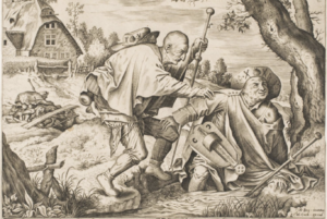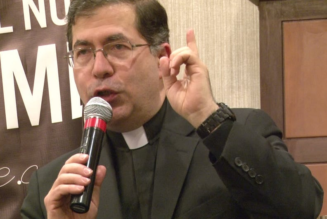Happy Friday friends,
And a very happy feast of the Immaculate Conception to you all.
Today’s is a feast in which I positively revel. It confounds our Protestant brethren that we should have such devotion to Our Lady, though I am always perplexed at their skepticism of Marian theology.
To suggest that God would not shield the mother of His son from original sin, and wouldn’t construct the whole of time and reality to accommodate an outpouring of the graces won by the Resurrection on to Mary before she or Christ were ever born seems, to me, to say you’d expect God to leave a job half done.
The key line in the Gospel for today, as I was reminded in the homily I heard, comes from the archangel: “Nothing is impossible for God.”
It’s not a wry observation to wave away the implausibility of the news he’s delivering, it is the fundamental rationale for God’s plan for the redemption of humanity.
It’s that line, I think, which should be the litmus test of my prayers — do I truly believe that nothing is impossible for God, and do my prayers reflect the knowledge that he can do anything and the expectation that He will do everything needed for my salvation?
Honestly, probably not as often as they should. But it’s something to work on for the rest of Advent.
Anyway, here’s the news.
The News
The Pillar broke some important news from Nicaragua yesterday. You’re going to want to give it your attention.
Imprisoned Nicaraguan Bishop Rolando Álvarez is willing to leave Nicaragua and is in rapidly declining health, multiple informed sources have told The Pillar.
Álvarez has been detained since August 2022, and is still in the early stages of a 26-year prison sentence imposed by the Ortega regime for refusing to knuckle under to the government’s seizure of Church property and crackdown on civil rights.
When he was first detained under house arrest, the bishop did initially refuse to go into exile, as hundreds of priests were expelled from the country, and chose instead to stay in Nicaragua and face the government’s actions against him.
Unlike other Nicaraguan priests who were given clear legal terms to agree to go into exile, we reported yesterday that Alvarez was given back in February a blank piece of paper to sign, and told nothing about what might happen to him if he did.
At the same time, we reported, his health is in serious decline and those closest to him have reasonable fears about how long he will be able to last in prison.
There will be some, I know, who will see this development as somehow a knock on the bishop, who has become an icon of stoic defiance against a repressive regime. But let’s be clear here: he did start off by refusing to go into exile and he has, without question, chosen prison over cooperating with the government.
That the bishop, now in failing health, is willing to go into exile but is being held a captive of the regime is not some kind of lesser status — Álvarez is an icon of the persecuted Church and the people of Nicaragua.
This is an important story, read the whole thing.
—
Pope Francis yesterday accepted the resignations of two senior leaders of the Syro-Malabar Catholic Church, the Eastern Church which has been embroiled for years in a spiral of liturgical conflict that has threatened repeatedly to veer into schism.
The dispute, in which a large majority of the clergy (and faithful, too, apparently) of the archeparchy have rejected liturgical renewals brought in by the Church’s governing synod and backed by the Vatican, has at times this year threatened to tear the Church apart, or even trigger a full-blown breach from Rome.
Forging any kind of resolution has been hampered by Cardinal Alencherry’s effective sidelining over unrelated, but equally unpopular, efforts to alienate Church lands — a move which ended up in civil court.
We’ve been predicting for a while that Pope Francis would have no real choice but to clean house across the Church’s leadership, and now he has started the job.
Retired Bishop Bosco Puthur has been drafted in as caretaker of the Ernakulam-Angamaly archeparchy for the time being, but this is obviously a short-term fix while Rome considers who — if anyone — is up to the job of knitting together the priests and people of the second-largest Eastern Catholic Church.
—
Yesterday there was a sudden flurry online after reports that Bishop Joseph Strickland had been “banned” from celebrating Mass in his former see, the Diocese of Tyler, Texas.
Citing a “known” source in the diocese, the website Lifesite carried the story but did not report who issued the supposed ban — presumably either the apostolic administrator of the diocese, Bishop Joe Vasquez, or the Holy See— and said it could not confirm if Strickland had been made aware of it.
It seemed like a big deal, and we were getting a lot of questions about it, so we looked into it.
The difference between a recently removed bishop being asked to refrain from public celebrations of Mass, so as not to create confusion or division in the diocese, and his being banned from doing so is considerable. One is an arguably reasonable request, the other an act of authority.
You can read the full story here.
—
Back in November, during the USCCB’s plenary assembly, the bishops suddenly cut their public session short and gaveled into a sudden executive session. Conference president Archbishop Timothy Broglio made the motion, citing “some matters that have come to my attention.”
When the bishops came out from the closed-door conference, they were universally tight-lipped about what they discussed and had, several said, been given a strict warning about not talking to the press about it.
Naturally, this all made us very, very curious. It took us a few weeks, but yesterday we were able to report the whole story.
Despite the text having been greenlit by the subcommittee on Native American affairs, the conference’s administrative committee, and the National Advisory Council, some bishops raised last-minute objections to some of the language.
Sources close to the conference told us that there were specific concerns that some of the language, which contained strong words of apology and moral responsibility from the bishops on issues like residential schools, could create legal liability issues and trigger lawsuits.
The draft was pulled from the agenda and will be brought back for consideration in June after some tweaking, we understand.
So what did the draft say? And what, exactly, was the problem? Read the whole story here.
—
The Vatican financial trial has finished its hearings and the judges have retired to consider their verdict on the dozens of charges brought against the 10 defendants.
They are expected to turn around a verdict in time for next weekend — we’ll see how they get on.
In the meantime, final arguments for the defense were made in the closing hearings this week, with lawyers for Raffaele Mincione accusing prosecutors of living in a parallel universe, ignoring their own evidence, and warping reality to suit an implausible narrative of a grand conspiracy where none exists.
I’ve long thought (and written) that the case for criminal action against Mincione was among the weakest cards in the prosecution’s hand, and that it is a mistake for the Vatican promoter of justice, Alessandro Diddi, to insist on trying a disparate, though often compelling constellation of apparently criminal acts by Vatican officials as one grand conspiracy.
A culture of institutional corruption tends to breed a thousand small-to-medium acts of fraud, theft, and abuse of office, rather than inspire everyone in the office to come together for one big score. Trying to present the one as proof of the other, I think, is an act of prosecutorial hubris that mortgages the chances of putting obviously bad actors out of business and behind bars for things they obviously did in the hopes of making a “case of the century.”
As we wait for the verdict, the real question, it seems to me, is how much the judges will feel bound to rule on Diddi’s “one big conspiracy” theory.
Will they be happy returning a mixed bag of convictions and acquittals, which could see lengthy prison terms for some defendants but fundamentally reject the prosecution’s central thesis? And if so, what will that mean for appeals by those found guilty?
We will find out.
—
Advent is a time to look with hope to the coming of Christ, at Christmas, for sure, but for the first few weeks we focus on his coming in glory at the end of time. Of course, a sign we’ve hit the end times will be the rise of the antichrist — a biblical figure often invoked in our public discourse.
For what it’s worth, in 2000, Cardinal Giacomo Biffi suggested that the antichrist might already be among us, “most likely now disguised as a philanthropist supporting creeds like vegetarianism, animal rights or pacifism, or advocating dialogue with Orthodox or Anglican believers.”
Of course, I reflexively disagree with the cardinal about dialogue with our Orthodox brethren, though I do think we should hear him out on vegetarianism.
Anyway, for a rundown on what you need to know about the antichrist, read our whole story here.
False Messiahs
It wasn’t pure seasonal inspiration, of course, that prompted us to carry an explainer on the antichrist.
Fr. Thomas Reese, S.J., former editor of American Magazine, invoked the term in a column last week, in which he wrote about the temptation to authoritarian politics and contrasted the kingship of Christ with the pitches of political strongmen who promise to protect and ultimately deliver us.
“If we compare the Gospel message with that of Trump and other authoritarian leaders, we can only conclude that he and they are antichrists,” wrote Reese.
Fr. Tom is, I am sure he won’t mind my saying, a friend and colleague with whom I disagree about many, many things (though crucially not Vatican finances, a topic to which he is nearly as devoted as I am).
And I am not sure I can wholly agree with his views on antichrists.
Reflexively, I hate the use of the term when applied to politicians. For a start, I think it gives most of them far too much credit.
I’ve always thought most of our politicians, Trump certainly included, represent the American tradition of the prosperity Gospel preacher and televangelist, more than anything else — all mad hair and man tans, restless hands and rictus grins.
The political pitch I see most often these days boils down to this: “God (if you have one) wants you to have what you want — come get yours now, for a small contribution, because the bad people want to take it from you!”
Prosperity hucksters offer a relentless, offensively simple logic: You, the mark, tell them what you want. And they tell you that you can have it. If you get it, it’s all thanks to them — no one else could have delivered for you.
If you don’t get it? Well, that’s probably your fault. Maybe you just need to give a little more.
I think this is true of political strongmen promising deliverance from whatever things that go bump in the night.
Though I think it is also true of democratic utopianists who insist that with the right checks and balances, the right legislation and institutions, we will all live in harmony and prosperity.
It’s absolutely true of those who seem to want the whole of human civilization dissolved into an alphabet soup of sexuality and gender and grievance, in which we’d all be “free” to choose whoever and whatever we want to be. Except if you’re Jewish, apparently. As we’ve seen in cities and on campuses for weeks now, some hatreds transcend the politics of “inclusivity” — indeed, antisemitism seems to be intrinsic to it.
You can certainly argue one or other political choice is more likely to get you closer to what you want (or to total disaster) than the other, but they’re all fundamentally promising something they can never deliver and have no real interest in — peace on earth and goodwill to all men.
The real problem with our politics, as I see it, is not the especially egregious examples of vindictive politicians who aspire to be above the law, or those who aspire to re-educate us to appreciate and realize some pluralistic Eden. They are symptoms of the problem, not the underlying cause.
The real illness in our public life is the heresy that politics can save us at all — and our own generation by no means invented this.
So long as our cultural horizon stretches no farther than an election cycle or three, and never beyond our own lifetimes, and so long as we live our lives illuminated by mere temporal lights, we will always be prone to believing our doom is at hand and this or that government is our only savior.
This isn’t a purely secular problem, either, so far as I can tell. I’m all too aware of those Catholics who seem convinced — and out to convince — that Trump (or any other politician) is burdened with some kind of messianic purpose.
He bloody well isn’t, of course. And anyone who says otherwise is a crank, a fool, or a charlatan.
Now it’s true the Church highlights under its own definition of the deceptions of the antichrist “especially the ‘intrinsically perverse’ political form of a secular messianism.”
But given the eschatological significance the term has in our common usage, I think lumbering Trump (or Obama, or Biden, any other squalid politico) with the label “antichrist” is itself a way of buying into the nonsense that the next election, and it’s always the next one, is, literally, the end of the world. Or at least it could be, unless you vote the right way.
I think they’re all false messiahs. But I wouldn’t give them the credit for being the antichrist — or let people raise money off that kind of hysteria.
For everything else, as we await the Lord’s coming this Advent, we should take to heart his warning about knowing neither the day nor the hour. But I’m willing to bet it won’t fall on an election day.
Maranatha.
It ain’t what I call rock’n’roll
Taylor Swift is Time Magazine’s person of the year, I have been repeatedly and reliably informed.

It is a decision that seems to have aggrieved and delighted quite a number of people. To me, the choice seems to say a great deal about how far into irrelevance Time has slid.
The last interesting issue of Time I read was from the week of the Nixon resignation. I found it in the downstairs bathroom at my parents’ house over Thanksgiving last year and was spellbound, not by the narrative of events (historic though they were) but by the insane quality of the prose in column after column.
If Time employed writers of that technical ability today, I’d buy a lifetime subscription just to enjoy the properly constructed sentences, and the correct use of words like “refute,” which most journalists today seem to think just means “deny.”
They don’t, of course. Time, like most other formerly influential magazines, has shriveled to a desiccated husk of itself, clinging to relevance like a cicada shell to the bark of a tree. That’s why it has to resort to naked gimmickry, like designating the aural equivalent of a bowl of white rice as “person of the year.”
Don’t get me wrong, I have nothing against Taylor Swift as a person — in fact, I’m rather more pro Taylor than agin’ her.
Until recently, I had no real understanding of who or what she was, beyond being the strange focus of alarming obsession for a certain demographic of suburban middle-class female. So, on a road trip earlier this year, I asked JD what the big deal was — I have no idea why I thought he’d know, the man’s basic ignorance of music is legend.
But, to my surprise, he was able to give me a fascinating overview of the contours of Ms. Swift’s career and I confess to being impressed with what I heard.
Re-recording her entire back catalog just to stick it to her former record label and nuke the value of her own master tapes is the kind of bloody-mindedness I can respect, and had Time chosen to honor her in 2021, when she first came up with the idea, I probably would have seen the logic.
But I cannot say I much fancy her actual records, though, which seem to me to be inoffensive acoustic empty calories. I recently called Swift the “Panera Bread of music,” which I considered an apt analogy, until I learned Panera Bread were selling a caffeinated lemonade that can actually kill a man. Show me the Swift song that can stir the pulse, let alone send you into cardiac arrest.
That crack generated some… angry feedback from her fans. That’s fine, Twitter.com is the place for unvarnished opinions. But her naming as “person of the year” seems calculated to lean into her obsessive following, whatever the mediocrity of her output.
To the best of my knowledge, her biggest achievements this year have been a successful concert tour and video, and dating an American football player.
Is that really of greater cultural significance and impact in 2023 than, say, the discovery of ripples in the fabric of space-time?
Now that’s what I call rock’n’roll.
See you next week,
Ed. Condon
Editor
The Pillar
Comments 32
Services Marketplace – Listings, Bookings & Reviews











